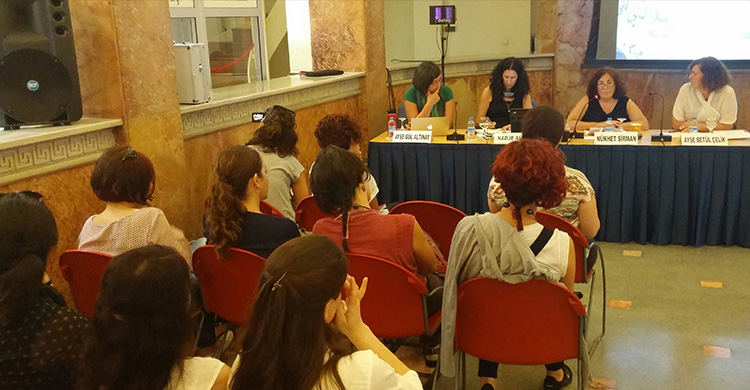17/09/2015
Gender and Peace in the Middle East
Sabancı University Gender and Women's Studies Forum held a panel titled "Gender and Peace in the Middle East" on Wednesday, September 2, 2015 at the Karaköy Minerva Palas.
The moderator of the panel was Sabancı University Faculty of Arts and Social Sciences member Ayşe Gül Altınay, and speakers were Nadje Al-Ali, Nükhet Sirman and Ayşe Betül Çelik.
Nadje Al-Ali spoke on “Militarism, Authoritarianism, Sectarianism: The Uphill Struggle of Iraqi Women for Peace”; Nükhet Sirman on “Working for Peace” and Ayşe Betül Çelik on “Kurdish Women's Perception of Conflict and Peace.”
The first panelist, Nadje Al-Ali, spoke about the difficult struggle of Iraqi women for peace. Commenting on militarism and sectarianism, Al-Ali reminded listeners of the brutality that ensued after DAESH's kidnapping of Ezidi women, saying "It was unbelievably violent. I never believed that violence on such a scale was possible today. No one did anything. No one assisted those fighting against DAESH."

Al-Ali said she was attempting to document gender-based violence in Iraq, explaining how this became instrumentalized. "When people talk about Iraq, it is as if everything would be fine if DAESH were to go away, but it won't be fine. Violence in Iraq is rooted in gender" said Al-Ali. She noted that gender- and sect-based violence in Iraq was inevitable after the occupation.
Nadje Al-Ali said that over the last 10 days, tens of thousands of Iraqis took to the streets against corruption and sectarianism, and that women were not only a part of this movement, but on the front lines as well.
Arguing that gender-based violence is not different from sectarianism, Al-Ali suggested that both base their politics on the female body.
Speaking next, Boğaziçi University Professor Nükhet Sirman elaborated on her studies on peace. Sirman said that the word "peace" suffered from a progressive deterioration of value, continuing "Those who speak of peace are made to look like criminals." Explaining that as an anthropologist she worked hard for peace, Sirman said that the Kurdish women arrested during the crackdown against the KCK organization in 2009 were fighting not only male dominance, but the militarist hegemony of the state as well.
Sirman said that the Women For Peace Initiative meant they could fight a common cause with Kurdish women, and called for more serious treatment of women struggling for peace, and peace itself. Sirman concluded by saying that working for peace was a learning process for her, and advising that peace must not fall victim to militarism.
Finally, Sabancı University faculty member Ayşe Betül Çelik discussed the perception of conflict and peace in Kurdish women. Speaking on the trauma of mass migration suffered by Kurdish women in the 90s, Çelik said that migrant women felt anger and longing. Çelik said that Kurdish women adopted the peace process slogan of "Let no mother cry" to call for peace.





